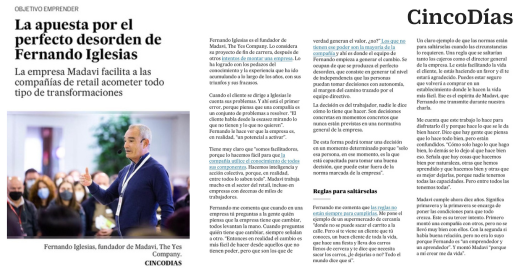With the title “The ‘perfect disorder’ approach of Fernando Iglesias” (La apuesta por el perfecto desorden de Fernando Iglesias, in the original Spanish), the newspaper Cinco Días has published a conversation between Fernando Iglesias, CEO of Madavi The Yes Company, and the journalist Juanma Romero. We reproduce the content of the interview below, translated into English:
The company Madavi facilitates the implementation of all types of transformations by retail firms
Fernando Iglesias is the founder of Madavi, The Yes Company. He considers this to be his “end of degree” project, after other attempts to start a company. He has made it work by using the areas of knowledge and experience that he has built up over the years, through both triumphs and failures.
When clients come to Iglesias they tell him their problems. And therein lies the first mistake, because they think that a company is a set of problems to be solved. “The client speaks from scarcity, looking at what they don’t have and what they don’t want.” Fernando makes them see that the company is, in reality, “a potential to be activated”.
He is very clear that “we are facilitators, because we make it easy for the company to use the knowledge of all its components. We conduct intelligence and collective action, because, in reality, within the firm they know everything.” Madavi does a great deal of work in the retail sector, even in companies with tens of thousands of employees.
Fernando tells me that when you ask people in a company to say whether that company needs to change, everyone raises their hand. When you ask them who has to change, they always point to someone else. “So in reality, change is easier to conduct from those people who have no power but who are the ones who really generate the value, right?
Those who don’t have that power are the majority of the company and that is where Fernando’s team begins to generate change. They work to produce perfect disorder, which consists of generating such a level of independence that people can make decisions autonomously, regardless of the path outlined by the management team.
The decision is the employee’s, no one tells them how to do it. These are specific decisions at specific times that are never provided for in a company’s general regulations.
In this way they can make a decision at a given moment because “it is only that person, at that moment, who is qualified to make a good decision, which may be outside the company’s established norms.”
Rules made to be broken
Fernando tells me that the rules are not always there to be followed. He gives me the example of a local supermarket “where you can’t take a shopping cart out onto the street. But if a customer that you know comes to you, a good lifelong customer who has two carts full of beer as he is having a party and tells you that he needs to take the carts off the premises, would you let him or not? Everyone says ‘yes’. A clear example that the rules are there to be broken when circumstances require it. A rule that both the cashiers and the general manager of the company would break. You are making the customer’s life easier, you are doing them a favour and they will be grateful to you. You can be sure that they will come and shop again at an establishment where their lives are made easier. That is the spirit of Madavi, which Fernando transmits to me during our talk.
He tells me that he does this job out of enjoyment and in order to do what he is good at. He says there are people who think they do everything right, but they are confused. “As I only do what I do well, I leave the rest to the people who do those things well. He points out that there are things that we do well by nature, others that we have learned and also do well, and others that are better left alone, because no individual has all the abilities. But among all of us we have them all “.
Madavi has turned ten years’ old
Madavi has just turned ten years’ old. The name means ‘spring’ and it is spring that is responsible for providing the conditions for everything to grow. This is his third attempt. First, he set up a company with others, but he didn’t get along very well with them. With the second there was a good relationship, but it was not his thing because Fernando is “an entrepreneur and a learner.” And then he set up Madavi “because creating gives me life.”


